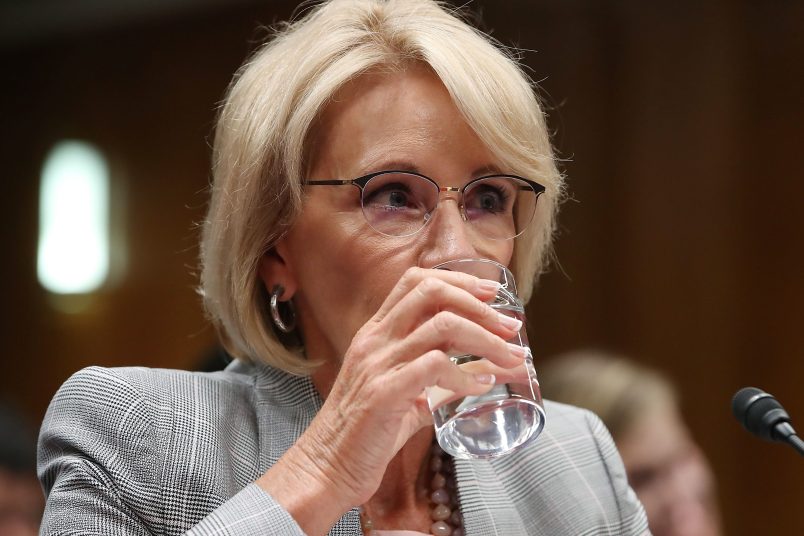WASHINGTON (AP) — Students defrauded by for-profit colleges will get a reprieve from the Education Department’s push to ease regulations for those schools because the government said it would miss a deadline for releasing an updated rule on loan forgiveness.
The department had been set to issue the new regulation, known as borrower defense, by Nov. 1 so it could take effect at the start of the 2019 school year. The delay means the rule won’t apply until the 2020 school year or later, according to Clare McCann, a higher education expert with New America think tank.
The department, in a federal court filing late Tuesday , cited pending litigation, the number of public comments on the proposal and “the complexity of the issues” in explaining why the deadline would pass.
Student groups have sued Education Secretary Betsy DeVos over her efforts to rewrite the Obama-era regulations and ease protections for students. Last month, a judge ruled that her decision to freeze the existing protections while she writes a new rule was unlawful and said the Obama rule should take effect.
The court is expected to spell out the next steps in the process next week.
DeVos has made deregulating the for-profit college industry a priority, saying the Obama administration’s policies were too generous to students and too expensive for taxpayers. In the filing, the department said it was “committed” to developing new regulations.
Her proposal seeks to water down many Obama-era policies. Students could only apply for loan forgiveness after they go into default. They would have to prove that the school intentionally misled them, which could require financial and legal resources the students may lack. Schools could continue to force students to sign away their rights to sue.
Under DeVos, the department has begun awarding many students only partial relief on their claims of fraud. Claims approved by the previous administration provided full forgiveness.
DeVos’ critics accuse her of putting industry interests ahead of students.
Aaron Ament, president of the National Student Legal Defense Network, a group that has been suing DeVos over these regulations, said the missed deadline is “a tremendous victory for students.”
“Since taking office, Secretary DeVos and her team of former corporate executives have taken every possible step to put the interests of predatory, for-profit institutions ahead of what is best for students and taxpayers.”
The Education Department said in a statement Wednesday that the agency is “thoughtfully addressing” the comments received and will publish the regulations when they are completed.
“The goal is to have strong regulations that treat students and taxpayers fairly, not meet a deadline,” the department said.
The statement did not address whether the publication of another Obama-era regulation known as gainful employment will also be delayed. Under that rule, schools that repeatedly graduate students who are unable to make enough money to pay off their student loans will lose federal money.
Steve Gunderson, president of Career Education Colleges and Universities, the industry lobbying group, said the Obama administration’s policy was to “declare war on the sector and start closing schools.” DeVos’ regulations, he said, represent “appropriate balance for due process for students and schools.”
But Gunderson described the missed deadline as a “huge problem.”
“It is going to create such regulatory uncertainty among students, among schools, among the sector, among the government,” Gunderson said. “No one will know what to do. This is not the way we should run the government.” He said “clarity, consistency and due process” are needed.
Gunderson and McCann said the failure to meet the deadline demonstrated that the department is understaffed.



